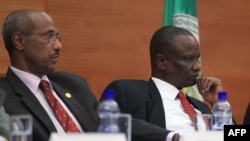A compromise peace deal for South Sudan got off to a shaky start Tuesday as a government spokesman said his side would reject the agreement if it includes any new conditions, even as an expanded mediation team was invited to add to or change the agreement.
"There is no way for us to accept anything new other than what was agreed," said South Sudan Information Minister Michael Makuei, even as the IGAD Plus mediators were meeting for the first imte, and poring over the new compromise deal.
IGAD Plus was set up last month. Members include the United States and its partners in the troika for South Sudan, the United Kingdom and Norway; the United Nations, the European Union, the African Union, China and five African nations.
IGAD Plus' lead mediator, former Ethiopian foreign minister Seyoum Mesfin, invited the mediators to add to the compromise peace deal in any way they see fit.
On Friday, the compromise deal is to be handed to negotiators for President Salva Kiir's government, Riek Machar's armed opposition movement and a group of former political detainees. They are expected to take the document back to their leaders before the three parties return to Addis Ababa for what is supposed to be a final round of talks, set to begin in early August.
Those talks will wrap up on August 17, the day IGAD has set as the deadline for a final peace deal to be signed. An earlier March 6 deadline had also been called the last chance for a South Sudan peace deal, but it came and went with no agreement.
Maintains status quo
A draft summary of the compromise peace deal was handed to negotiators for the government, Machar's rebels and the former detainees last month.
The rebels' lead negotiator, Taban Deng Gai, rejected the draft agreement at the time, saying it maintained the status quo in South Sudan by keeping President Kiir as head of state, giving his side a majority of cabinet positions and a majority in parliament.
But, said Gai, the rebel side would still be willing to use the compromise agreement as the basis for moving forward with peace talks, leaving a glimmer of hope that a deal will be signed in four weeks' time and the fighting that has rocked South Sudan since Dec. 15, 2013 will finally end.
At least 10,000 people have been killed, some 2.5 million have been displaced and nearly 5 million face hunger in the next few months because of the ongoing conflict.
The fighting has also severely disrupted oil production, the main source of the South Sudan government's revenues, and brought what the World Bank has called the world's most oil-dependent economy to its knees.





